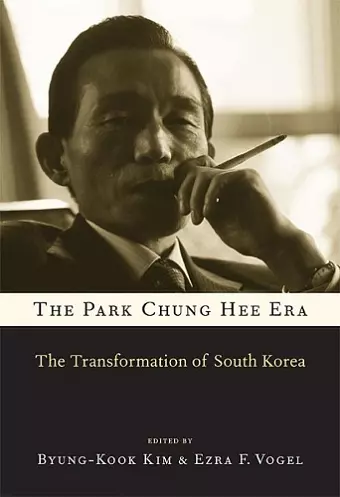The Park Chung Hee Era
The Transformation of South Korea
Ezra F Vogel editor Byung Kook Kim editor
Format:Paperback
Publisher:Harvard University Press
Published:10th Apr '13
Should be back in stock very soon

This remarkable book will establish itself as the most significant work on the Park period. -- Stephan Haggard, Graduate School of International Relations and Pacific Studies, University of California San Diego
In 1961 South Korea was mired in poverty. By 1979, it had a powerful industrial economy and a vibrant civil society that led to democracy eight years later. This volume examines the transformation as a study in the politics of modernization, contextualizing many historical ambiguities in South Korea’s trajectory toward sustainable economic growth.
In 1961 South Korea was mired in poverty. By 1979 it had a powerful industrial economy and a vibrant civil society in the making, which would lead to a democratic breakthrough eight years later. The transformation took place during the years of Park Chung Hee's presidency. Park seized power in a coup in 1961 and ruled as a virtual dictator until his assassination in October 1979. He is credited with modernizing South Korea, but at a huge political and social cost.
South Korea's political landscape under Park defies easy categorization. The state was predatory yet technocratic, reform-minded yet quick to crack down on dissidents in the name of political order. The nation was balanced uneasily between opposition forces calling for democratic reforms and the Park government's obsession with economic growth. The chaebol (a powerful conglomerate of multinationals based in South Korea) received massive government support to pioneer new growth industries, even as a nationwide campaign of economic shock therapy-interest hikes, devaluation, and wage cuts-met strong public resistance and caused considerable hardship.
This landmark volume examines South Korea's era of development as a study in the complex politics of modernization. Drawing on an extraordinary range of sources in both English and Korean, these essays recover and contextualize many of the ambiguities in South Korea's trajectory from poverty to a sustainable high rate of economic growth.
This remarkable book will establish itself as the most significant work on the Park period. -- Stephan Haggard, Graduate School of International Relations and Pacific Studies, University of California San Diego
Park emerges in these essays as a remarkably skillful politician, and the political dimensions of almost all economic policies were foremost in his calculations...This excellent collection of essays convincingly argues that any examination of South Korea as a model of how a poor country can climb out of poverty needs to factor in the personality of Park Chung Hee and the domestic and international politics of the time. -- Michael J. Seth * The Historian *
This significant work on the Park Chung Hee era is composed of 21 chapters by as many Korean specialists...The work provides an enhanced understanding of the political and economic goals of Park Chung Hee (i.e., rich country and strong military) and the forceful means he was willing to use to achieve these goals. The scope and insightfulness of this collection of essays on this critical period in South Korean history make it a must for undergraduate and graduate library collections on Korea. It is strongly recommended for private collections on Korea as well. -- J. M. Peek * Choice *
Somehow [this] escaped the notice of much of the broader world...This [collection] is superb, as it offers a very detailed and also fairly comprehensive look at the seminal years for South Korean economic growth…Not everyone will want 650 pp. on economic (and other) policy under South Korean autocracy, but if you do this is the book for you. -- Tyler Cowen * Marginal Revolution *
- Nominated for James B. Palais Prize 2013
ISBN: 9780674072312
Dimensions: unknown
Weight: unknown
744 pages